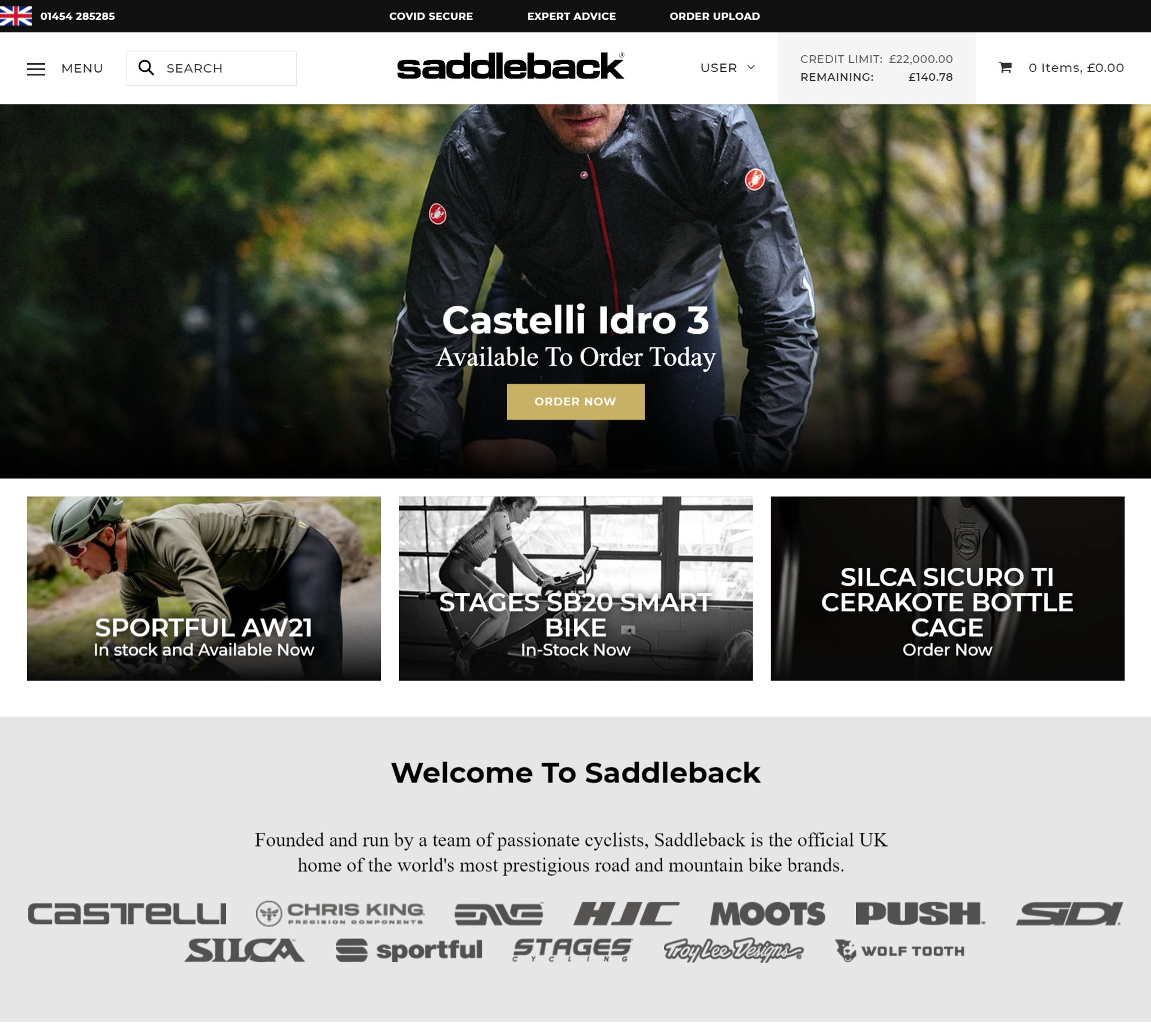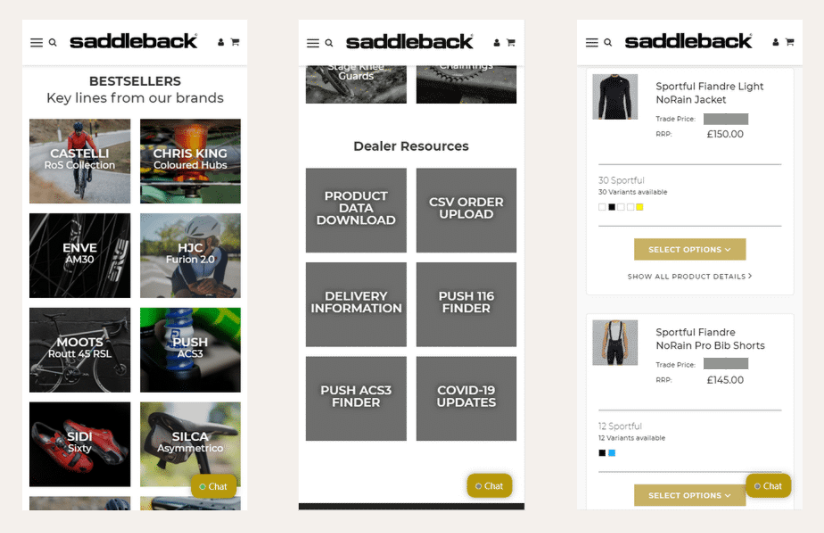B2B Ecommerce: Why Embrace It and How to Succeed
B2B ecommerce is fast following in the footsteps of the now well established D2C model. There’s always been huge potential for businesses to get closer to customers, boost revenue and expand market position through ecommerce, and now there’s a commercial risk of not embracing it. On Shopify, businesses can now combine their B2B and DTC sales in one platform, reducing overheads and providing a seamless digital experience for all their customers.
Written By
Swanky

Business-to-business (B2B) ecommerce has been gradually coming of age, but it is gaining increasing momentum. At Swanky we are seeing increasing numbers of wholesale businesses move their B2B operations onto Shopify, to benefit from the efficiency and enhanced customer experience that B2B ecommerce brings to trade customers. Part of this growth is a distinct change in the B2B buyer demographic, which is now primarily made up of millennials1 – the original digital natives.
There’s been a historic reluctance in some industries to embrace B2B ecommerce, with fears that it would become a replacement for person-to-person interactions, diminish the value of relationships between customers and account managers, as well as reduce visibility in the business of its customers.
However, demand for a streamlined ecommerce buyer experience is growing, and wholesale businesses are needing to respond. Business buyers are looking online first to discover new suppliers and products and it’s now a significant competitive advantage to be able to offer an effective, personalised ecommerce purchasing experience.
In this article, we’ll look at the changing B2B ecosystem, unpick the different routes into ecommerce, discuss why Shopify is a suitable platform for B2B ecommerce, and share more about why it’s so important that businesses embrace this channel.
Why embrace B2B ecommerce?
1. Increase revenue
With an online store dedicated to your business customers, you can offer a 24/365 shopping environment that has personalised pricing for each company, bespoke deals, payment terms and fulfilment options. Once a company is created in the backend, with relevant terms defined, they can customise and place an order without speaking to an account manager.
With this improved account efficiency can come increased purchase frequency and an uplift in revenue. You’ll likely experience secondary benefits as well, including increases in average order value (AOV) and reduced customer churn.
B2B Shopify stores also leverage Shopify customer accounts, enabling seamless re-ordering of previous purchases. This type of detail reduces friction in the customer journey, generating more revenue.
2. Reduce operational costs
Often the main driver for businesses to embrace B2B ecommerce is the reduction of operational costs. By offering online purchasing, you can reduce the sales admin workload of the team. They no longer need to manually process orders, send invoices or liaise over fulfilment details, which means their time can be better spent working on the relationship with the customer, listening to their feedback and growing their customer lifetime value (CLTV).
You may also be able to make operational savings by optimising couriers and picking the best deal for delivery of each order, or by offering a delayed single delivery rather than individual shipments as availability allows.
3. Improve customer experience
Customer experience is crucial for both client acquisition and retention. The difference in customer behaviours across DTC and B2B is reducing, with buyers demanding a better browsing and purchasing process. In fact, one study found that 70% of business buyers expect a consumer-like experience2.
By offering a seamless online experience, distinctly customised for B2B, your clients will feel empowered in their purchasing journey. Those customers typically buy more products and more frequently than those who don’t, and as we know, it’s cheaper and more beneficial to generate growth from a loyal customer base than acquire new customers3.
4. Reduce organisational silos
By bringing your wholesale activity online, you can combine your DTC and B2B sales into one streamlined platform, cutting overheads and reducing operational complexities. Having an ecommerce platform at the centre of your B2B sales process often has the side effect of reducing operational silos within the business. This means greater visibility of customer behaviours, which includes account activity, product popularity, and purchasing history etc.
5. Be more sustainable
Becoming more sustainable should be the ambition of every business. By opening up a B2B ecommerce platform, businesses can embrace sustainable manufacturing processes such as on-demand production and reducing carbon emissions through logistics and processing.
Using a partner like Swanky also means you’re offsetting the carbon footprint of your platform production.
Routes into B2B ecommerce
There are obvious gains that businesses can enjoy when they embrace B2B ecommerce, but choosing the right route will depend on the individual business. Whether you have an incredibly technical, complex product that includes multiple customisation options, or you have hundreds of thousands of SKUs, there’s a solution for you.
1. Wholesale
This is the most common way a business can generate sales online; by having their own wholesale storefront for wholesale transactions. Distributor/retailer customers can browse, order and manage their account through your store. They can keep track of their purchases, view the status of their orders, download invoices and get help through the platform, often via instant messaging or a chatbot.
Platforms like Shopify Plus are designed with all the infrastructure in place to offer a personalised experience and pricing for different customers upon login.
2. Marketplace
The role of marketplaces in B2B ecommerce has made great strides forward in recent years. Unsurprisingly, SMEs have the most exposure on these platforms, possibly because of the perceived complexity or inertia within a business to change their online sales strategy to include marketplace presence. But it’s clear the demand is there as nearly half of business buyers will increase marketplace purchasing in the next one to two years.
The benefits of starting out on a marketplace if you’re new to B2B ecommerce are obvious – limited upfront resource needed to get going, support through the platform, and instant exposure to an audience that includes new and possibly some existing customers. A marketplace may also allow your business to assess how ready the infrastructure is to offer a full wholesale service via an ecommerce platform.
For instance, you could test a marketplace with holiday stock returns, and not only benefit from moving stock on that would otherwise not be sold, but also reducing warehousing and restocking costs.
3. Parts and manufacturing
If you’re a business taking in raw materials and completing part of the manufacturing process, or you supply parts to other businesses, you could still benefit from an ecommerce presence. This is particularly relevant to the automotive industry, whether selling parts or raw materials to car brands or garages, as offering independent, 24/7 ordering is essential for your customers to deliver their service/products to consumers.
4. Distribution
If your business imports and/or distributes to other wholesalers, an ecommerce storefront would allow your customers greater independence in their research and purchasing journey. You may have complexities around individual customer terms, pricing or payment methods, but it’s common to find that an ecommerce platform actually makes managing these factors easier and less time-consuming.
You may also have thousands of individual SKUs, so an ecommerce platform will make every single product discoverable in a search. You could see a significant uplift in your revenue just by getting each product line and variant onto an ecommerce platform.
Whichever route into B2B ecommerce you choose, you’ll be moving closer to your customers, opening up new prospects and providing a better customer experience.
Why customer experience matters
In B2B retail, customer experience (CX) refers to every interaction a buyer has with your business, whether independently or directly through one of your representatives. From the very first moment a prospect becomes aware of you, through to an ongoing relationship as a repeat customer or trusted partner, providing a positive experience is key to driving satisfaction and retention.
The B2B customer experience can sometimes be neglected on the assumption that since transactions are happening via 1-2-1 contact with an account manager, it’s already the best type of customer experience. But there are so many other touchpoints that matter, such as website experience, email communications, customer support etc. The ‘experience economy’ is the next battleground in B2B, just as it has been in DTC for some time.
There are many similarities between businesses in DTC and B2B that have a customer-centric approach, and the principle in both situations is simple – meet or exceed customer expectations.
We know that 89% of B2B researchers start their product hunt with a search engine, so it’s imperative that the experience on your website is smooth and fulfilling4. This is especially pertinent as 43% of B2B buyers would now prefer not to interact with a sales rep at all5.
In order to meet the needs of this audience, you want your buyers to feel confident in their purchasing decision without ever interacting with a person. As such, your self-serve portal, whether that’s an owned B2B ecommerce platform or a store on a marketplace, must provide all the information they need to achieve confidence in their purchase.
Shopify as a B2B ecommerce platform
Traditionally rooted in DTC ecommerce, Shopify has a reputation as one of the best platforms for retailers to grow their brands selling directly to consumers. However, over the past couple of years, Shopify has increasingly focused on its B2B offering, rolling out extensive B2B-specific functionality for wholesale brands. This allows brands to bring both their B2B and DTC sales onto one platform.
The main benefit of having your B2B and DTC storefronts on the same platform is that everything is in one place. That means everything from inventory, orders and pricing to logistics, fulfilment and shipping can live on one platform. No more separate software systems not talking to each other, no more reporting on multiple platforms, and no more data silos.
Here’s a look at some of the key features of Shopify Plus B2B:
- Company profiles: Manage multiple buyers and locations with distinct permission levels, payment terms, tax exemptions, and payment methods. Use Shopify Forms to integrate a new account request form into your store. Automatically save buyer information as a company account, enabling them to make wholesale purchases upon approval.
- Customer-specific catalogues: Provide a tailored shopping experience by assigning product catalogues to specific buyers or locations.
- Volume pricing: Simplify the implementation of quantity price breaks to encourage B2B customers to purchase in larger volumes.
- Custom discounts: Create exclusive promotional discounts tailored to your B2B buyers, applied on top of wholesale pricing.
- Quantity rules: Set conditional product and variant rules for customers, including minimums, maximums, case packs, and order increments.
- Easy reordering: Boost repeat business by allowing buyers to quickly reorder previous purchases directly from their customer accounts.
- Draft orders: Streamline workflows and quoting processes with the option to submit orders for review before approval and fulfilment on your online store.
- PO numbers: Easily capture purchase order (PO) numbers during checkout, with visibility in the admin, customer accounts, and via the Orders API.
- Quick bulk ordering: Provide buyers with a comprehensive list of all products and variants, enabling them to effortlessly select sizes, colours, and more from product pages or a dedicated order form.
- Flexible payment options: Simplify the purchasing process with payment terms and the ability to send invoices for seamless transactions. Enable B2B customers to pay for orders and invoices via PayPal, as well as securely storing customer credit card details for use on draft orders, invoices, and at checkout.
- Workflow automations: Leverage Shopify Flow, an advanced automation tool, now enhanced for B2B operations. Assign terms, send invoices, and more with support for companies and their locations.
- Sales rep permissions: Grant sales representatives tailored permissions in the admin, allowing them to access only assigned customers and place orders on their behalf.
- Personalisation: Enhance the B2B customer experience by delivering relevant content to the right audience through targeted personalised user journeys.
- Headless storefronts: Take full control of the buyer journey using Shopify’s APIs, developer tools, and a wide range of compatible apps.
Bespoke B2B ecommerce solutions with Swanky
As a Shopify Premier Partner, we’ve been building on Shopify’s already extensive capabilities to create custom user experiences and functionality for over 10 years. We help wholesale retailers tackle complex functionality such as bespoke tax rules and ERP integrations to enable a smooth buying experience for trade customers.
Check out some of our case studies below:
Magento to Shopify B2B migration for Natural Instinct
Frustrated by their costly Magento Enterprise B2B website, the Natural Instinct team engaged Swanky to help them migrate to Shopify Plus, which they saw as a more cost-effective ecommerce solution.
Swanky built this petcare brand a streamlined Shopify Plus B2B store, complete with bespoke app development to provide a custom credit solution and a bespoke weight check solution. Find out more in our case study.
Award-winning B2B ecommerce store for Saddleback
As a leader in the performance cycling industry, Saddleback has an extensive network of quality stockists across Europe. The brand’s award-winning UK B2B site is a portal for official distributors to view and purchase products at trade prices.

The team at Swanky created a customer-centric experience through the use of Shopify Plus functionality. We delivered a personalised pricing solution for different user tiers, a bespoke credit app that allows buyers to shop up to their credit limit, and a streamlined UX-led design that allows stockists to purchase easily and quickly.
You can read more about this project in the case study, which details an impressive 881% growth in sales.

Measuring B2B ecommerce success
As with any business growth project, it’s important to understand how to measure success. When you’re ready to take your B2B business into the ecommerce world, there are several benefits you can expect as we discussed earlier, but identifying and monitoring key performance indicators (KPIs) will help you quantify the positive impact of moving online. These could include direct revenue metrics such as:
- Total ecommerce sales
- AOV
- Repeat order frequency
It’s also important to set secondary KPIs that measure your progress on the way to achieving those revenue-related KPIs. This could include:
- Website performance – visits, traffic sources, interactions
- New customer acquisition
- Customer service interactions – volume and quality
- Returns volume and frequency
- Feedback and reviews
Embrace B2B ecommerce with Swanky
If you’re looking to take the next step in your B2B ecommerce journey, the experienced team at Swanky can help. Whatever stage of the journey you’re at, we’d love to explore your B2B ecommerce options with you. We have the Shopify expertise, you know your brand, so let’s talk.
For reference:
[1] https://www.sana-commerce.com/b2b-buyer-report/ [2] https://www.statista.com/statistics/1195343/b2b-revenue-made-through-e-commerce-channels-by-country/ [3] https://www.digitalcommerce360.com/2019/10/31/global-b2b-e-marketplace-sales-could-hit-3-6-trillion-in-five-years/ [4] https://www.brandingstrategyinsider.com/how-millennials-are-changing-the-b2b-buyer-profile/#.X80TnRP7Qch [5] https://www.thinkwithgoogle.com/consumer-insights/consumer-trends/the-changing-face-b2b-marketing/

